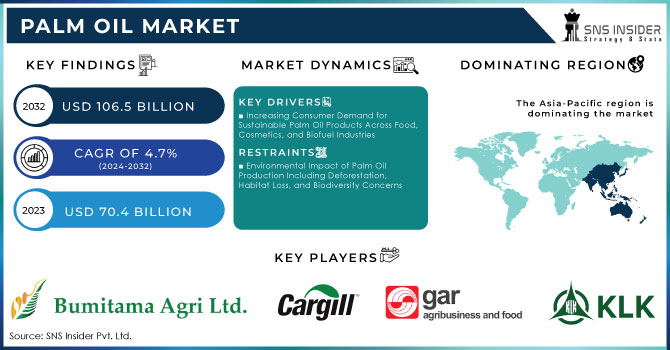The global palm oil market is experiencing robust growth, driven by its increasing demand across diverse industries such as food and beverages, cosmetics, biofuels, and consumer goods. Palm oil, a versatile and cost-effective vegetable oil derived from the fruit of the oil palm tree, is a crucial ingredient in many everyday products. Despite challenges related to sustainability, technological innovations and regulatory frameworks are contributing to the growth of this market.
The Palm Oil Market Size was valued at USD 70.4 billion in 2023, and is expected to reach USD 106.5 billion by 2032, and grow at a CAGR of 4.7% over the forecast period 2024-2032.

Market Drivers
Rising Demand in the Food & Beverage Industry
The food and beverage sector remains one of the largest consumers of palm oil. Palm oil’s unique characteristics, such as its high stability at room temperature, longer shelf life, and cost-effectiveness, make it a popular choice for use in processed foods, snacks, margarines, and cooking oils. As global populations grow and consumer preferences shift toward affordable, long-lasting, and convenient food products, the demand for palm oil continues to rise.
Cosmetic and Personal Care Applications
The increasing adoption of palm oil in the cosmetics and personal care industry is another key driver of market growth. Palm oil is widely used in the production of soaps, shampoos, skin creams, and other personal care products due to its moisturizing and emulsifying properties. The growing demand for beauty products that feature natural ingredients is expected to further fuel the consumption of palm oil in this sector.
Biofuels and Green Energy Demand
The growing demand for sustainable energy solutions has led to the increased use of palm oil in biofuels and biodiesel production. Palm oil, when processed into biodiesel, is seen as a viable alternative to fossil fuels due to its renewable nature. As governments and organizations work toward reducing greenhouse gas emissions and adopting more eco-friendly energy sources, biofuels made from palm oil are gaining popularity, particularly in emerging markets.
Sustainability and Certification Initiatives
The palm oil industry has faced significant scrutiny over its environmental impact, particularly deforestation and biodiversity loss associated with oil palm plantations. In response, sustainability initiatives such as the Roundtable on Sustainable Palm Oil (RSPO) have been established to encourage the responsible production of palm oil. The growing demand for certified sustainable palm oil (CSPO) from major brands and consumers is creating new growth opportunities for producers that comply with environmental and social standards.
Key Trends and Opportunities
Technological Advancements in Palm Oil Production
Innovations in palm oil cultivation and processing are expected to enhance yield efficiency and reduce environmental impact. The development of high-yielding palm oil varieties, advanced plantation management techniques, and sustainable harvesting practices will contribute to greater productivity and lower deforestation rates.
Growing Consumption in Emerging Markets
As emerging markets, particularly in Asia-Pacific, Africa, and Latin America, continue to industrialize and experience rising disposable incomes, the demand for palm oil is set to increase. These regions are experiencing higher consumption of processed foods, personal care products, and biofuels, driving further growth in palm oil production and trade.
Regulatory Support for Sustainability
Governments and international organizations are increasingly focusing on sustainability in agricultural production. Regulations aimed at minimizing the environmental footprint of palm oil production are pushing the industry toward more sustainable practices. Policies that promote the use of certified sustainable palm oil are creating a favorable environment for sustainable growth in the market.
Market Segmentation
The palm oil market is segmented by type, application, and region:
- Type: Crude Palm Oil (CPO), Refined Palm Oil (RPO), Palm Kernel Oil (PKO), and Others.
- Application: Food & Beverages, Cosmetics & Personal Care, Biofuels, Household Products, and Others.
- Region: Southeast Asia remains the largest producer and exporter of palm oil, while emerging markets in Asia-Pacific and Africa are expected to drive future growth. North America and Europe are also witnessing rising consumption of certified sustainable palm oil.
Key Players
· Bumitama Agri Ltd.
· Cargill Inc.
· Felda Global Ventures Holdings Berhad
· First Resources Ltd.
· Golden Agri-Resources Ltd.
· IOI Corporation Berhad
· Kuala Lumpur Kepong Berhad (KLK)
· Musim Mas Holdings
· Sime Darby Plantation Berhad
· Wilmar International Ltd.
· Austindo Nusantara Jaya Tbk
· BASF SE
· Coconut Holdings Inc.
· Dharma Satya Nusantara Tbk
· Green Palm
· Maritim Palm Oil Sdn Bhd
· PT. Astra Agro Lestari Tbk
· PT. Perkebunan Nusantara III
· PT. Sinar Mas Agro Resources and Technology Tbk
· PT. Tani Indo Sejahtera
Conclusion
The palm oil market is positioned for continued growth, driven by demand across key industries such as food and beverages, cosmetics, biofuels, and consumer goods. As sustainability and responsible sourcing take center stage in the industry, palm oil producers are increasingly adopting eco-friendly practices to meet the evolving needs of consumers and regulatory requirements. With technological advancements and expanding market opportunities, the palm oil market is set to play a vital role in the global supply chain of essential products.
For more details @ https://www.snsinsider.com/sample-request/4629
Contact Us:
Akash Anand – Head of Business Development & Strategy
info@snsinsider.com
Phone: +1-415-230-0044 (US)









